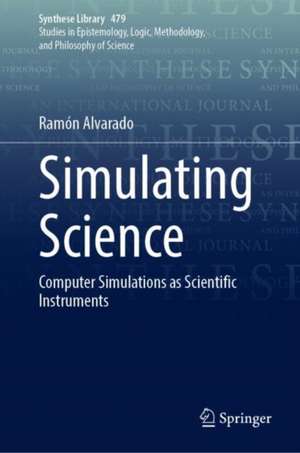Simulating Science: Computer Simulations as Scientific Instruments: Synthese Library, cartea 479
Autor Ramón Alvaradoen Limba Engleză Hardback – 24 aug 2023
Din seria Synthese Library
- 15%
 Preț: 638.43 lei
Preț: 638.43 lei - 18%
 Preț: 989.98 lei
Preț: 989.98 lei - 15%
 Preț: 596.69 lei
Preț: 596.69 lei - 18%
 Preț: 903.93 lei
Preț: 903.93 lei - 15%
 Preț: 586.88 lei
Preț: 586.88 lei - 15%
 Preț: 696.50 lei
Preț: 696.50 lei - 18%
 Preț: 892.90 lei
Preț: 892.90 lei - 15%
 Preț: 643.34 lei
Preț: 643.34 lei -
 Preț: 282.33 lei
Preț: 282.33 lei - 5%
 Preț: 372.19 lei
Preț: 372.19 lei -
 Preț: 443.10 lei
Preț: 443.10 lei - 15%
 Preț: 637.59 lei
Preț: 637.59 lei - 18%
 Preț: 958.88 lei
Preț: 958.88 lei - 15%
 Preț: 642.36 lei
Preț: 642.36 lei - 18%
 Preț: 1230.66 lei
Preț: 1230.66 lei - 15%
 Preț: 642.83 lei
Preț: 642.83 lei - 18%
 Preț: 1000.39 lei
Preț: 1000.39 lei -
 Preț: 389.70 lei
Preț: 389.70 lei - 15%
 Preț: 637.28 lei
Preț: 637.28 lei - 18%
 Preț: 952.26 lei
Preț: 952.26 lei - 18%
 Preț: 1231.32 lei
Preț: 1231.32 lei - 15%
 Preț: 645.96 lei
Preț: 645.96 lei -
 Preț: 395.85 lei
Preț: 395.85 lei -
 Preț: 400.47 lei
Preț: 400.47 lei - 18%
 Preț: 1225.48 lei
Preț: 1225.48 lei - 15%
 Preț: 638.89 lei
Preț: 638.89 lei - 18%
 Preț: 1232.09 lei
Preț: 1232.09 lei -
 Preț: 380.45 lei
Preț: 380.45 lei -
 Preț: 394.87 lei
Preț: 394.87 lei - 15%
 Preț: 640.37 lei
Preț: 640.37 lei - 15%
 Preț: 639.08 lei
Preț: 639.08 lei -
 Preț: 381.98 lei
Preț: 381.98 lei - 15%
 Preț: 643.00 lei
Preț: 643.00 lei - 15%
 Preț: 672.29 lei
Preț: 672.29 lei
Preț: 640.55 lei
Preț vechi: 753.60 lei
-15% Nou
Puncte Express: 961
Preț estimativ în valută:
122.59€ • 127.51$ • 101.20£
122.59€ • 127.51$ • 101.20£
Carte tipărită la comandă
Livrare economică 14-28 aprilie
Preluare comenzi: 021 569.72.76
Specificații
ISBN-13: 9783031386466
ISBN-10: 3031386469
Pagini: 164
Ilustrații: VIII, 164 p. 1 illus.
Dimensiuni: 155 x 235 mm
Greutate: 0.42 kg
Ediția:1st ed. 2023
Editura: Springer International Publishing
Colecția Springer
Seria Synthese Library
Locul publicării:Cham, Switzerland
ISBN-10: 3031386469
Pagini: 164
Ilustrații: VIII, 164 p. 1 illus.
Dimensiuni: 155 x 235 mm
Greutate: 0.42 kg
Ediția:1st ed. 2023
Editura: Springer International Publishing
Colecția Springer
Seria Synthese Library
Locul publicării:Cham, Switzerland
Cuprins
Chapter 1. Introduction: Instruments of Futures Past.- Chapter 2. Computer Simulations in Science.- Chapter 3. The rise of a dichotomy.- Chapter 4. The via negativa: Computer Simulations as distinct.- Chapter 5. Technical Artifacts, Instruments and a Working Definition for Computer Simulations.-Chapter 6. Hybrid all the way down.- Chapter 7. Implications of the instruments view of computer simulation.- Chapter 8. Conclusion.- Index.
Notă biografică
Ramón Alvarado is Assistant Professor of Philosophy at the University of Oregon. He researches the epistemic and ethical implications of the use of computational methods and technologies in science and society. He has published papers on the epistemic implications of data-driven technologies, such as artificial intelligence, in science as well as on the challenges of justifying our ubiquitous reliance on computer simulations for scientific inquiry. He also written about the challenges that opaque computational methods such as artificial intelligence, machine learning and big data pose to democratic processes.
Textul de pe ultima copertă
This book provides a philosophical framework to understand computer simulations as scientific instruments. This is in sharp contrast to existing philosophical approaches on the subject, which have historically understood computer simulations as either formal abstractions or as broadly construed empirical practices. In order to make its case, the volume contains a thorough examination of conventional philosophical approaches as well as their respective limitations. Yet, also, unlike other accounts of computer simulations from the perspective of the philosophy of science, this book incorporates insights from the philosophy of technology and the history of science. Hence, the book offers philosophers of science, technologists and other researchers interested in the topic, a thorough overview of the philosophical issues regarding the design, development and deployment of computer simulations in science and science-based policy making.
Caracteristici
The first book in the last decade to cover the role and importance of scientific instruments in relation to contemporary scientific practice The only book dealing with computer simulations as scientific instruments and not as formal abstractions or broadly defined empirical practices Brings insights from the history and philosophy of science, the philosophy of engineering, and the philosophy of technology to the much-debated issue of the role of computer simulations in science
